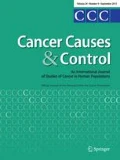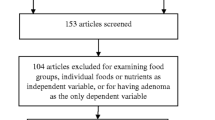Abstract
Objective: In this study we examine the combined effects of Western diet, age at diagnosis, and genetic susceptibility.
Methods: We use data collected as part of an incident case–control study of colon cancer. Family history of colorectal cancer, N-acetyltransferase (NAT2), and gluathione-S-transferase (GSTM-1) are studied with Western diet and age at diagnosis.
Results: A significant interaction between age at time of diagnosis, Western dietary pattern, and family history of colorectal cancer (p for interaction = 0.03) was detected. Those with a family history of colorectal cancer who ate a predominantly Western diet were at increased risk of colon cancer (OR 14.0, 95% CI 3.9–50.1 for ≤55 years; OR 7.7, 95% CI 2.0–29.1 for 56–66 years; OR 1.6, 95% CI 0.8–3.2 for ≥67 years) compared to those without a family history of colorectal cancer and low levels of a Western diet. Associations with the Western diet were stronger than individual components of the dietary pattern. Neither NAT2 nor GSTM-1 showed significant interaction with Western diet.
Conclusion: The extent to which diet comprising a Western dietary pattern influences risk of colon cancer is dependent on age. This dietary pattern also appears to modulate the colon cancer risk associated with a family history of colon cancer.
Similar content being viewed by others
References
Slattery ML, Boucher KM, Caan BJ, Potter JD, Ma KN (1998) Eating patterns and colon cancer. Am J Epidemiol 148: 4–16.
Adlercreutz H (1990) Western diet and Western diseases: some hormonal and biochemical mechanisms and associations. Scand J Clin Lab Invest 50: 3–23.
Kampman E, Slattery ML, Bigler J, et al. (1999) Meat consumption, genetic susceptibility, and colon cancer risk: a United States Multicenter Case-control study. Cancer Epidemiol Biomarkers Prev 8: 15–24.
Potter JD, Slattery ML, Bostick RM, Gapstur SM (1993) Colon cancer: a review of the epidemiology. Epidemiol Rev 15: 499–545.
Kerber RA, Slattery ML, Potter JD, Caan BJ, Edwards SL (1998) Risk of colon cancer associated with a family history of cancer or colorectal polyps: the diet, activity, and reproduction in colon cancer study. Int J Cancer 5: 157–160.
Groden J, Thlveris A, Samowitz W, et al. (1991) Identification and characterization of the familial adenomatous polyposis coli gene. Cell 66: 589–600.
Toniolo P, Boffetta P, Shuker DEG, Rothman N, Hulka B, Pearce N (1997) Application of Biomarkers in Cancer Epidemiology. Lyon: IARC Scientific Publications, no. 142.
Caporaso N, Landi MT, Vineis (1991) Relevance of metabolic polymorphisms to human carcinogenesis: evaluation of epidemiologic evidence. Pharmacogenetics 1: 4–19.
Nebert DW, McKinnon R, Puga A (1996) Human drug-metabolizing enzyme polymorphisms: effects on risk of toxicity and cancer. DNA Cell Biol 15: 273–280.
Dennis MJ, Massey RC, Cripps G, Venn I, Howarth N, Lee G (1991) Factors affecting the polycyclic aromatic hydrocarbon content of cereals, fats and other products. Food Addit Contam 8: 517–530.
Takeuchi M, Hara M, Inoue T, Kada T (1998) Adsorption of mutagens by refined corn bran. Mutat Res 204: 263–267.
Slattery ML, Edwards SL, Caan BJ, Kerber RA, Potter JD (1995) Response rates among control subjects in case-control studies. Ann Epidemiol 5: 245–249.
Slattery ML, Potter JD, Caan BJ, et al. (1997) Energy balance and colon cancer-beyond physical activity. Cancer Res 57: 75–80.
Edwards S, Slattery ML, Mori M, et al. (1994) Objective system for interviewer performance evaluation for use in epidemiologic studies. Am J Epidemiol 140: 1020–1028.
Slattery ML, Caan BJ, Duncan D, Berry TD, Coates A, Kerber R (1994) A computerized diet history questionnarire for epidemiologic studies. J Am Diet Assoc 94: 761–766.
Liu K, Slattery ML, Jacobs D Jr, et al. (1995) A study of the reliability and comparative validity of the CARDIA dietary history. Ethn Dis 4: 15–27.
Slattery ML, Jacobs DR Jr (1995) Assessment of ability to recall physical activity of several years ago. Ann Epidemiol 5: 292–296.
Bigler J, Chen C, Potter JD (1997) Determination of human NAT2 acetylator genotype by oligonucleotide ligation assay. Biotechniques 22: 682–690.
Bell DA, Taylor MA, Butler E, et al. (1993) Genotype/phenotype discordance for human arylamine N-acetyltransferase (NAT2) reveals a new slow acetylator allele common in African-Americans. Carcinogenesis 14: 1689–1692.
Zhong S, Wylie AH, Barnes D, et al. (1993) Relationship between the GSTM-1 genotype polymorphism and susceptibility to bladder, breast, and colon cancer. Carcinogenesis 14: 1831–1834.
Slattery ML, Kerber RA (1994) Family history of cancer and colon cancer risk: the Utah Population Database. J Natl Cancer Inst 86: 1618–1626.
Le Marchand L, Wilkens LR, Hankin JH, Kolonel LN, Lyu LC (1999) Independent and joint effects of family history and lifestyle on colorectal cancer risk: implications for prevention. Cancer Epidemiol Biomarkers Prev 8: 45–52.
Chen J, Stampfer MJ, Hough HL, et al. (1998) A prospective study of N-acetyltransferase genotype, red meat intake, and risk of colorectal cancer. Cancer Res 58: 3307–3311.
Welfare MR, Cooper J, Bassendine MF, Daly AK (1997) Relationship between acetylator status, smoking, diet and colorectal cancer risk in the north east of England. Carcinogenesis 18: 1351–1354.
Willett WC, Stampfer MJ, Colditz GA, Rosner BA, Speizer FE (1990) Relation of meat, fat, and fiber intake to the risk of colon cancer in a prospective study among women. N Engl J Med 323: 1664–1672.
Giovannucci E, Rimm EB, Stampfer MJ, Colditz GA, Ascherio A, Willett WC (1994) Intake of fat, meat, and fiber in relation to risk of colon cancer in men. Cancer Res 54: 2390–2397.
Kerber RA, Slattery ML (1997) Comparison of self-reported and database-linked family history of cancer data in a case-control study. Am J Epidemiol 146: 244–248.
Author information
Authors and Affiliations
Rights and permissions
About this article
Cite this article
Slattery, M., Potter, J., Ma, KN. et al. Western diet, family history of colorectal cancer, NAT2, GSTM-1 and risk of colon cancer. Cancer Causes Control 11, 1–8 (2000). https://doi.org/10.1023/A:1008913619957
Issue Date:
DOI: https://doi.org/10.1023/A:1008913619957




